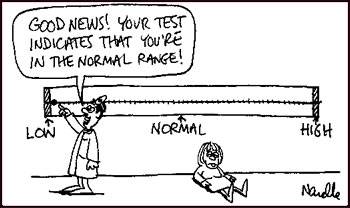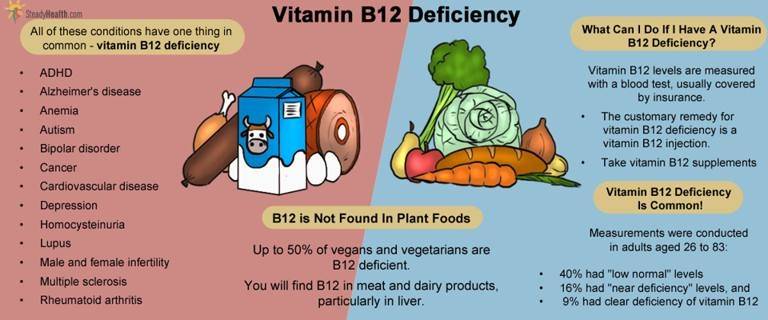What do these patients all have in common that their GP failed to diagnose?
- A 10 year old boy with autistic spectrum disorder symptoms such as anxiety, anger issues and difficulty concentrating.
- A senior citizen whose repeated falls and balance issues are attributed to mini strokes.
- A 40 year old mother of 3 who is too tired and depressed to care fully for her kids.
- The loving father diagnosed with dementia who now can’t even remember the names of his own children.
- A 35 year old man who starts wetting himself and who can no longer walk or grip things with his hands.
- A young woman unable to conceive a baby or who has had multiple miscarriages.
- A 78 year old with foot and leg numbness who has been diagnosed with incurable diabetic neuropathy.
All of these patients, presenting with vastly different symptoms, have one thing in common. They have all been labeled with a dozen different disorders but in reality they all suffer from the same medical condition – Vitamin B12 Deficiency.
This isn’t a fad or something new. Vitamin B12 deficiency is a long established disease but unfortunately it is rarely tested for by your GP and often routinely overlooked. It is said that 40% of people aged between 26 – 80 years of age have plasma B12 levels in the low reference range and that 9% have an outright deficiency. Up to 20% of senior citizens have vitamin B12 deficiency and a whopping 50% of vegetarians and 80% of long term vegans who don’t supplement with B12 are deficient. B12 can affect anyone, of any age at any time, and therefore it is critical to ask your GP to test you for this.
Why is Vitamin B12 so important?
Your body needs 13 vitamins to stay alive and to keep you healthy. Your body can’t make vitamins by itself and so your body depends on you providing them through food. Unfortunately plants don’t need Vitamin B12 and therefore it is not present in vegetables which is why vegetarians are at such high risk of developing B12 deficiency.
B12 is mainly found in meat. As people age they tend to reduce their meat intake and therefore their risk of deficiency increases. Others sources include fish, poultry, eggs and dairy.
Another risk factor for B12 deficiency is medical drugs. A number of medicines actually deplete the body of vitamin B12. Medicines that have been shown to deplete B12 include the oral contraceptive pill, antibiotics, anti-inflammatories, anti-diabetic medications, reflux medications such as Pariot and Nexium as well as cholesterol lowering medications. As people age that are often put on these medications which is another reason why B12 deficiency is more common as people age.
So if you are on any of these medications then your chance of having a B12 deficiency just jumped significantly.
Vitamin B12 is used by most of the systems of the body but is particularly important in:
- Protecting the heart

- Supporting energy levels
- Preventing nerve damage and assisting with nerve repair
- Bone health
- Optimal cognition and brain function
- Wound healing
- Anti-ageing
- And especially mental and mood changes such as depression, dementia, irritability and sleepiness.
As you can see B12 is used in most of the systems of the body and therefore it’s symptom picture can be so wide and varied that it can be difficult to spot. This is why having a simple B12 blood test is so important and can potentially save your life.
Yes!!! Though uncommon, extreme B12 deficiency, called pernicious anemia, can be fatal if left unchecked and untreated.
What are some of the main signs and symptoms associated with Vitamin B12 deficiency?
Mental Changes
Irritability, apathy, sleepiness, paranoia, depression, anxiety, dementia, violent behavior and in children developmental delay and autistic behavior.
Neurological signs and symptoms
Pain, tingling, numbness, tremors, balance issues, stiffness, spasticity of muscles, muscle weakness and vision changes.
Vascular Problems
Strokes or mini strokes, heart attacks, palpitations, low blood pressure especially on standing and DVT
Immune
Poor wound healing, and increase susceptibility to infections plus an increase risk of cancer
Digestive Issues
Indigestion, abdominal pain, constipation, diahorrea and acid reflux
Reproductive function
Abnormal PAP smears, impotence, unexplained infertility or multiple miscarriages
Other signs and symptoms include
Shortness of breath, weakness, fatigue, osteoporosis, ringing in the ears, vitiligo (white patches on the skin) and prematurely grey hair.
B12 deficiency is also commonly found in clients with a the MTHFR defect. You can read more about the MTHFR gene defect by clicking here.
What should I do about it?
Go to your doctor and get tested. Ask for a serum Vitamin B12 test.
Please, please, please ask for copies of your results. Once you get the results email them to me at tony@capalabanaturalhealth.com.au or drop them into the clinic. I’ll have a look at them for you and advise you if there is an issue.
I can hear you ask … But surely my GP will tell me if there’s a problem.
Unfortunately in Australia the Vitamin B12 reference ranges are set very low, in fact well below international standards, and therefore a lot of people who have the test are told by their GP that they are fine … when in fact they are quite deficient. In Australia the bottom of the reference range is set at 1
35 pmol/L while countries such as Japan have it set at 500 pmol/L. There is significant evidence that symptoms can occur anywhere under 500 pmol/L
It’s heartbreaking to hear of clients who have had symptoms for years, which now are irreversible, and which could have been corrected with a simple blood test and a inexpensive supplement.
So please don’t delay …. Get your B12 tested as soon as possible and ask your loved ones and friends to do the same.
Written by Award Winning Naturopath Tony Daniel of Capalaba Naturopath Health.
Click here for more information on Naturopathy or how our Naturopath can help you.



